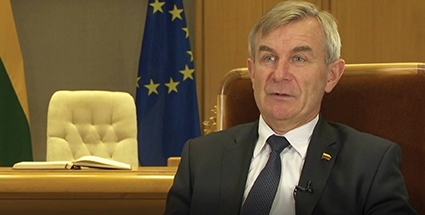From Gruzia to Sakartvelo & the Man behind the Idea
Exclusive Interview
Lithuania is soon to start calling Georgia “Sakartvelo” instead of the soviet-style “Gruzia”. The idea belongs to the speaker of Lithuania’s parliament, Viktoras Pranckietis. GEORGIA TODAY contacted him in Vilnius to find out more about this wonderful gift to the Georgian people.
I think I’d be speaking on behalf of all pro-western society in Georgia (and thankfully, it’s an overwhelming majority), if I start by saying a big thanks for this gesture! What do you think the practical and symbolic implications are of this change?
In February 2015, I was in Georgia having a pleasant chat with an administrator of the hotel I was staying in. That man said that the word “Gruzia” is unpleasant to Georgians, that it’s perceived as imposed by outside sources, and that Georgian’s have their own name for their country – Sakartvelo. That’s when I started thinking about it. Two years on, I met with Georgian President, Giorgi Margvelashvili, and remembered that little chat, so I asked him: ‘Mr. President, would it be good news for you if I announced that in Lithuanian, Georgia would be called Sakartvelo instead of Gruzia?’ And he promptly said that it would make the Georgian people very happy. So, the simple idea became a reality, and now I have the pleasure to call on the Lithuanian people to adopt Sakartvelo as the name for Georgia. Maybe at first not as a substitute, but as a synonym. I think it would be great: if this makes both nations happy, let’s do it. It’s a small gift between our two nations and I hope people will embrace it.
Georgia has aspirations to join the Euro-Atlantic community, as Lithuania did back in 2004. How can Lithuania help Georgia accomplish its goal?
We do our best to support the Eastern Partnership countries, and the EU’s South-Eastern enlargement. I’d say we are advocates and leaders when it comes to bringing these issues to the table with our partners in Brussels and Strasburg. We are one of the first to bring Georgia’s challenges forward and call on other countries to support that wonderful country. We’re standing beside Georgia, and the name change is yet another demonstration of our firm support.
What Impressions did you have after your visit to Georgia?
You know, I felt very sad as I stood near the boundary line just 30 km away from Tbilisi, and when I saw those people that live beyond the barbed wire, they said ‘we live as Georgians, our country is Georgia, but currently I’m beyond the fence’. And then I saw the places where the refugees live. I don’t think they are good living conditions. We have a common experience of Russian occupation and we, Lithuanians, know very well how those people feel: we felt the same for more than 50 years. As for what we can do for Georgia and Georgians, we have our know-how and we are justifiably proud of what we, together with other Baltic countries, have achieved: we are a very good example of how a totalitarian regime can be peacefully transformed into a modern, democratic state. And that I think is an example worth following for Georgia, too, to fulfill its dreams and ambitions.
Vazha Tavberidze












